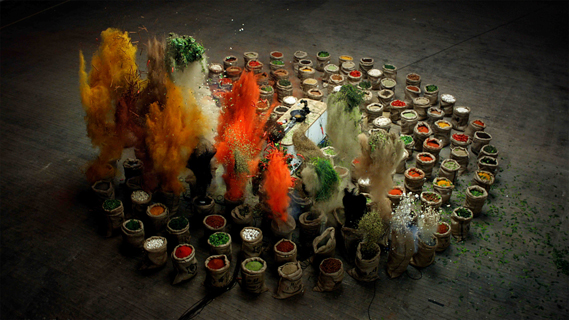Even the most perfect reproduction of a work of art is lacking in one element: its presence in time and space, its unique existence at the place where it happens to be.
-- Walter Benjamin, "Art in the Age of Mechanical Reproduction" (1936)
This month it was my (Dave's) turn to choose a liquor, and I've been enchanted by the Art in the Age of Mechanical Reproduction distillery. They took the same name as a famous essay by Walter Benjamin that, in 1936, began to theorize what kinds of changes reproducability and capitalism would bring upon Art. In the end, Benjamin muses, art wrested from its connection to ritual and tradition becomes inherently political, since it is "designed for reproducability."
And, in that sense, it is an apt moniker for the Art in the Age distillery, which prides itself on being sustainable and local. They have preserved original buildings on the site of their distillery and use regional grains and local botanicals in their drinks.
I'd wanted to use their Rhubarb Tea liquor for our April liquor, but alas, they were sold out at the fancy Bristol liquor store. I think, though, that was a stroke of luck, because their Sage liquor (which I got partly because you, Joe, have a thing for sage) is delicious.
It's not entirely sage-based, though - the name Sage seems to come from the fact that it is based on the writings of Bernard McMahon, who served as a botanical advisor to Thomas Jefferson. The botanical play on words is just right - hipsters like the Art in the Age kids love puns.
So, this month's liquor, unlike Pernod from May, is delicious and drinkable and, I think, will become a staple of our liquor cabinet.
Dave's tasting notes:
Smell: Citrusy. Lemony. Although the description of "furniture cleaner - think Pledge™" sounds like a damning condemnation of Sage, it really isn't. The scent is subtle, but certainly citrus - but not an indeterminate citrus - definitely lemon.
 |
| Consuela or Dave? You decide, America. You decide. |
Out of the bottle, Sage takes on different properties. It's sweet and herby and minty - a heady combination, a bit like Bénédictine, but less heavy.
Taste: A boom of herbs. So many herbs with a citrus finish. But the primary flavor is herbs, and it is absolutely delicious. [Joe is typing this for Dave as he dictates. Quoth Dave: "Gosh, I should've written my dissertation like this. 'It's good', but make it sound better than that." Joe considers career as stenographer.]
 |
| "I've got 'It's good'. What next?" |
Joe's tasting notes:
Smell: "This smells like tea*!" I proclaimed. Dave looked at me like I was batshit crazy. To wit: I do tend to say things that don't, on the surface, seem to be rooted in reality. Upon closer inspection, however, I am often correct in my initial batshit observations. Once poured into a glass, however, Sage takes on an entirely different profile. All its herbaceous qualities bloom, though lavender** is the principle nose for me.
Taste: Go to a plant nursery and direct yourself to the herbs. Take a look at all those herbs. Alllllllll those herbs. So many, right? Imagine that those herbs explode in your mouth, a veritable Hiroshima on your palate. But imagine that instead of your face melting off in the fallout, it feels instead like the most delicious smörgåsbord of herbaceous delight. This is what a sip of Sage is like. The dominant flavor for me is still lavender, but it rounds out into a truly spectacular and complex combination of Every Herb I've Ever Loved***.
* As it turns out, Sage is made with black tea. BOO-YAH.
** Dave also looked at me cockeyed when I swore I smelled lavender. Gentle reader, do you not think I deserve, at the least, a "You're so smart, Joe!" from Dave or, even better, a dozen oatmeal raisin cookies (my favorite!) at the most? Please leave a comment below telling Dave what I deserve. Do not let me down.
*** All The Herbs. ALL OF THEM.
Smell: "This smells like tea*!" I proclaimed. Dave looked at me like I was batshit crazy. To wit: I do tend to say things that don't, on the surface, seem to be rooted in reality. Upon closer inspection, however, I am often correct in my initial batshit observations. Once poured into a glass, however, Sage takes on an entirely different profile. All its herbaceous qualities bloom, though lavender** is the principle nose for me.
Taste: Go to a plant nursery and direct yourself to the herbs. Take a look at all those herbs. Alllllllll those herbs. So many, right? Imagine that those herbs explode in your mouth, a veritable Hiroshima on your palate. But imagine that instead of your face melting off in the fallout, it feels instead like the most delicious smörgåsbord of herbaceous delight. This is what a sip of Sage is like. The dominant flavor for me is still lavender, but it rounds out into a truly spectacular and complex combination of Every Herb I've Ever Loved***.
 |
| Mouth, meet Sage. |
** Dave also looked at me cockeyed when I swore I smelled lavender. Gentle reader, do you not think I deserve, at the least, a "You're so smart, Joe!" from Dave or, even better, a dozen oatmeal raisin cookies (my favorite!) at the most? Please leave a comment below telling Dave what I deserve. Do not let me down.
*** All The Herbs. ALL OF THEM.
No comments:
Post a Comment